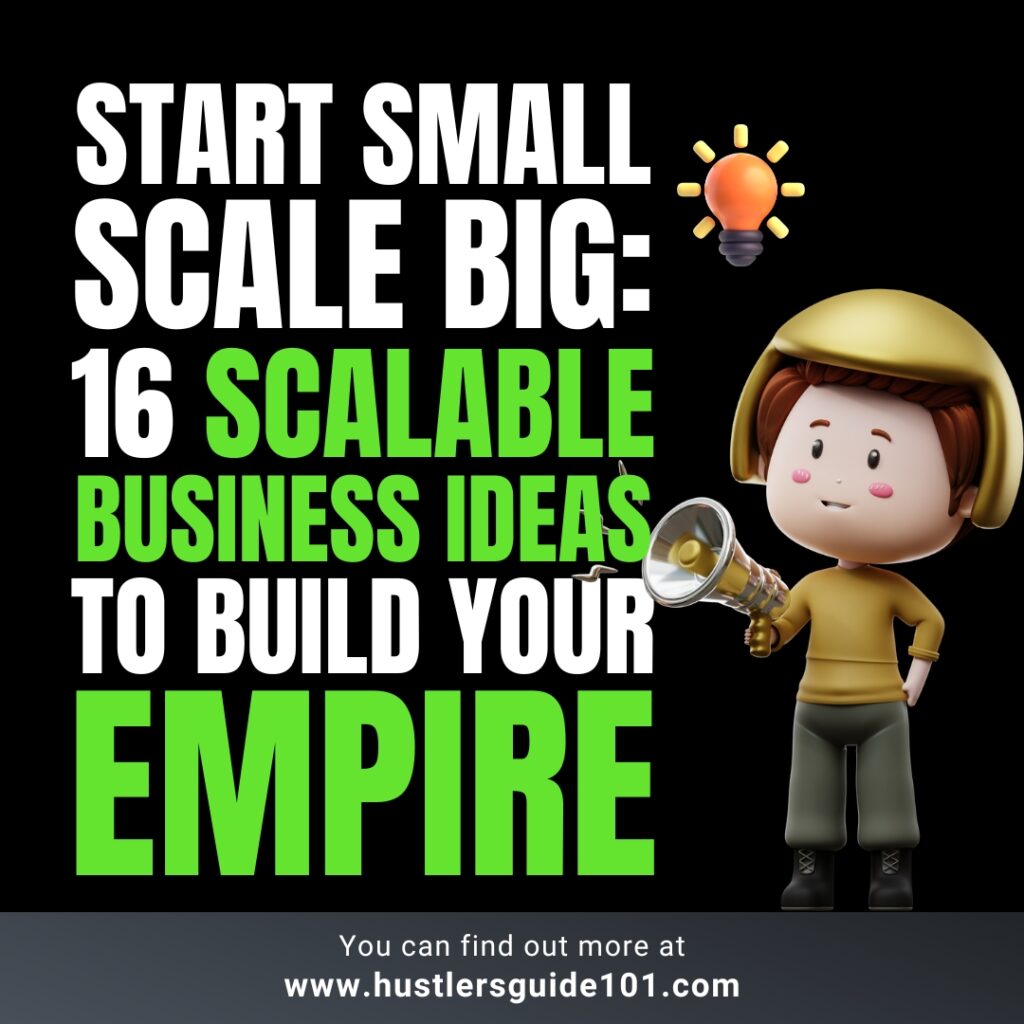
Do you dream of financial freedom, flexible schedules, and being your own boss? The idea of starting a business is exciting, but it can be overwhelming to find the right idea that is both scalable and profitable. The good news is, with the right mindset and idea, you can turn your dreams into a reality. In this blog post, I will share 16 scalable business ideas that can help you turn your passion into a successful business.
Whether you have a specific skill set or are just looking for inspiration, there’s something for everyone on this list. If you’re ready to take the leap and start your own business, keep reading to discover scalable business ideas that can help you achieve your entrepreneurial goals.
Technology-Based Scalable Business Ideas
Did you know that the global SaaS market is projected to reach $307 billion by 2026? That’s just one example of the potential for technology-based businesses to grow and thrive. Whether you’re a tech enthusiast or just looking for a profitable venture, here are some exciting ideas to consider:
Mobile App Development
Mobile app development is a lucrative and scalable business idea for entrepreneurs with a strong tech background. With the increasing number of smartphone users worldwide, the demand for mobile apps is on the rise.
Mobile app developers can create unique and engaging apps for businesses, individuals, and organizations. The development process involves designing the user interface, writing the code, testing the app, and launching it on app stores. A successful app can generate substantial revenue through in-app purchases, advertising, or subscription fees.
Real-life Example
The popular dating app, Tinder, has over 57 million users globally. It connects people based on their location and preferences through swipes. Tinder generates revenue through a subscription-based model called “Tinder Plus” which offers additional features like unlimited swipes and the ability to change locations.
Pros
- Wide target audience with millions of potential users.
- Potential for recurring revenue through subscriptions and in-app purchases.
- Ability to work remotely and collaborate with a global team.
- Creative freedom to design and develop unique apps.
Cons
- Highly competitive market with numerous established players.
- The high initial cost to hire a team of developers and designers.
- Need for ongoing maintenance and updates to keep up with technology advancements.
SaaS (Software as a Service)
SaaS or Software as a Service is a cloud-based business model where software applications are hosted by a third-party provider and offered to customers over the Internet. This means that businesses don’t have to worry about the hassle of physical software installation, maintenance, and upgrades.
SaaS applications can be accessed from anywhere, anytime through a web browser or app, making it easy for companies to scale and grow their operations. With SaaS, businesses can save money on IT infrastructure and hardware costs, and instead focus on their core operations. It’s no surprise that the SaaS market is projected to reach $157 billion by 2024, showing the tremendous potential of this business model.
Real-life example:
Slack is a cloud-based team collaboration tool. It allows teams to communicate and collaborate seamlessly across different devices and locations, with features like messaging, file sharing, and integrations with other software tools. Slack has been successful in scaling its business, with over 12 million daily active users and a market value of over $20 billion.
Pros:
- Low upfront costs for customers
- Automatic software updates and maintenance
- Scalability and flexibility for growing businesses
- Easy accessibility and compatibility with various devices
Cons:
- Dependence on Internet connectivity
- Data security concerns for sensitive information stored on the cloud
- Limited customization options for some SaaS applications
E-commerce Platform
E-commerce platforms have emerged as popular and profitable business ideas in recent years, enabling businesses of all sizes to sell their products and services online. With the rise of online shopping, e-commerce platforms have become an essential tool for businesses to reach a wider audience and generate revenue.
These platforms offer a range of features, including product listing, payment processing, inventory management, and order fulfillment, making it easier for businesses to manage their online sales. As more consumers shift to online shopping, e-commerce platforms are expected to continue to grow and offer lucrative business opportunities.
Real-life Example:
An example of a successful e-commerce platform is Shopify. Shopify is a leading e-commerce platform that allows businesses to easily create and manage their own online stores. With features such as customizable templates, payment processing, and shipping integration, Shopify has helped over 1 million businesses worldwide to start and grow their online presence.
Pros:
- Wide customer reach through the internet
- Convenient and accessible for customers
- Lower overhead costs compared to brick-and-mortar stores
- Ability to track customer behavior and tailor marketing strategies accordingly
Cons:
- High competition among e-commerce platforms
- Requires effective marketing strategies to stand out
- Technical issues may occur such as website downtime or security breaches
Online Course Creation
Online course creation has become a popular way to monetize knowledge and expertise. This business idea involves creating and selling educational content in various formats such as video, audio, and text through an online platform. The demand for online courses has surged in recent years, with the global e-learning market projected to reach $325 billion by 2025.
Online course creators can leverage their expertise in a particular area and create courses to help others learn and acquire new skills. By creating engaging and informative content, course creators can attract a wide range of learners and generate passive income.
Real-Life Example:
One real-life example of a successful online course is MasterClass. This platform offers online courses taught by renowned experts in various fields such as cooking, music, writing, and more. Users can learn from experts such as Gordon Ramsay, Shonda Rhimes, and Serena Williams, among others.
Pros:
- Flexible schedule for both creators and learners.
- Low overhead costs since no physical classroom or materials are required.
- Ability to reach a global audience.
- Opportunity to generate passive income through course sales.
Cons:
- Creating high-quality course content can be time-consuming and require expertise.
- Heavy competition in the online education market.
- Difficulty in ensuring student engagement and completion of the course.
Virtual Reality/Augmented Reality
Virtual Reality (VR) and Augmented Reality (AR) are cutting-edge technologies that allow users to experience immersive digital environments in new and exciting ways. VR involves using a headset and hand-held controllers to fully immerse users in a computer-generated world. On the other hand, AR overlays digital information in the real world through smartphones or smart glasses, enhancing the user’s real-world experience.
These technologies are revolutionizing industries such as gaming, healthcare, education, and architecture by creating new and engaging ways to interact with digital content. As VR and AR continue to advance, they offer endless possibilities for businesses to create innovative and unforgettable experiences for their customers.
Real-Life Example:
A popular example is Oculus Quest 2, which allows users to play games, watch movies, and even attend virtual events. An example of AR is the mobile game Pokemon Go, which overlays digital creatures in the real world through a smartphone camera.
Pros:
- Immersive and engaging experience for users
- Opportunities for businesses to create unique and interactive marketing campaigns
- Potential for use in training and education, particularly in fields such as healthcare and engineering
- Continuously evolving technology with new applications and possibilities.
Cons:
- High cost of entry for VR technology, including headsets and powerful computers
- Limited adoption of AR technology, particularly in comparison to VR
- Potential for motion sickness or other negative physical effects from prolonged use.
Service-Based Scalable Business Ideas
The pet industry is expected to reach $281 billion by 2023. With a diverse range of options and low startup costs, service-based businesses can be an excellent choice for those looking to launch a new venture. Let’s explore some promising ideas together.
Social Media Marketing Agency
Social media marketing agencies are businesses that provide social media marketing services to other businesses. Their services may include creating and managing social media accounts, developing content, implementing ad campaigns, and analyzing results to optimize performance.
Social media has become a vital tool for businesses to connect with their audience and promote their brand, and social media marketing agencies can help businesses achieve their marketing goals by leveraging social media platforms.
Real-Life Example:
One example of a successful social media marketing agency is Hootsuite, which offers a suite of social media management tools to help businesses manage their social media presence across multiple platforms.
Pros:
- High demand for social media services
- Low startup costs compared to other marketing agencies
- Flexibility to work with clients remotely
- Potential for high profits through client retention and upselling
Cons:
- Intense competition from other social media marketing agencies
- Constantly evolving social media algorithms and trends require staying up-to-date with the latest changes
- High-pressure environment to deliver results for clients
Content Creation Agency
A content creation agency that specializes in creating and delivering engaging, high-quality content that helps businesses achieve their marketing and branding goals. Content can take many forms, such as blog posts, social media posts, videos, podcasts, and infographics.
The agency works with businesses to understand their target audience and create content that resonates with them. They may also offer services such as content strategy development, SEO optimization, and content distribution across multiple platforms.
Real-Life Example:
One example of a content creation agency is Contently, which provides content creation and distribution services for a variety of clients, including Coca-Cola, Google, and American Express.
Pros:
- Helps businesses create engaging content that drives traffic and leads
- Offers a range of services, from content creation to distribution
- Provides a cost-effective alternative to hiring an in-house content team
Cons:
- May require ongoing investment in content creation to maintain results
- Quality of content may vary depending on the agency’s expertise and resources
- Difficult to measure the ROI of content creation efforts
![59 Content Frameworks [50M+ Views & $10M+ sales]](https://hustlersguide101.com/wp-content/uploads/2023/09/ebook-for-blog-1024x535.jpg)
Digital Marketing Consultancy
A digital marketing consultancy is a business that provides expert advice and guidance to companies on how to improve their online presence and reach their target audience through various digital marketing channels.
Digital marketing consultants analyze a company’s current marketing strategy and provide recommendations for improvement, as well as develop and implement new marketing campaigns.
Real-Life Example:
Ignite Digital is a full-service digital marketing consultancy that specializes in helping small and medium-sized businesses improve their online presence and drive revenue growth through customized digital marketing strategies.
Pros:
- Offers expertise in various digital marketing channels such as SEO, PPC, social media, and email marketing.
- Can provide a fresh perspective and insights to improve overall marketing strategy.
- Can offer cost-effective solutions compared to hiring a full-time marketing team.
Cons:
- Requires continuous adaptation to the ever-changing digital landscape.
- Can be difficult to measure the effectiveness of digital marketing efforts.
- May face stiff competition from other digital marketing consultancies.
Freelance Writing Services
Freelance writing services refer to the business of offering writing services to clients. These writers create written content for various purposes, including blog posts, articles, social media content, and more.
They work on a project basis and charge clients a set fee for their services. Freelance writers have the flexibility to work with a wide range of clients and choose the projects they want to work on. With the rise of content marketing, the demand for freelance writing services has grown significantly in recent years.
Real-Life Example:
One example of a freelance writing service is Scripted, a platform that connects freelance writers with businesses in need of content. Scripted offers a wide range of content creation services, including blog posts, product descriptions, and social media content.
Pros:
- Flexibility in terms of work schedule and location.
- Potential to earn high income based on skills and experience.
- Ability to choose projects and clients.
- Opportunity to develop a diverse portfolio of work.
Cons:
- Inconsistent income due to project-based work.
- Competition with other freelance writers for jobs.
- Responsible for managing own taxes, insurance, and benefits.
Translation Services
Translation services involve the conversion of written or spoken language from one language to another. It’s a business that caters to individuals or companies that need documents, websites, or other content translated accurately and efficiently.
With the growth of global trade and communication, translation services have become increasingly important in bridging language barriers and promoting cross-cultural understanding.
Real-Life Example:
TransPerfect is a leading translation services company that offers professional language solutions and technologies to businesses around the world. With over 90 offices worldwide and a team of more than 5,000 professionals, TransPerfect offers a wide range of services, including translation, interpretation, localization, and global content management.
Pros:
- Provides valuable service to businesses and individuals needing accurate translations
- High demand for translation services in today’s globalized world
- Can work with clients from all over the world, regardless of location
- Can be operated as a home-based business with low overhead costs
Cons:
- Requires fluency in at least two languages
- High competition in the industry may require niche specialization to stand out
- Quality control is essential for ensuring accurate and professional translations
Product-Based Scalable Business Ideas
In 2020, e-commerce sales reached a staggering $4.28 trillion worldwide. From beauty products to pet supplies, there are countless opportunities to turn your passion for products into a successful venture. With the right strategy and a unique offering, you can carve out a niche in the competitive world of product-based businesses.
Here are some of the most promising product-based business ideas to explore.
Private Label Products
Private label products refer to the practice of a retailer partnering with a manufacturer to produce goods that are then sold under the retailer’s brand name. The manufacturer creates the product according to the retailer’s specifications, and the retailer markets and sells the product as their own.
This business model has become increasingly popular due to the lower costs of production and the ability for retailers to differentiate themselves from competitors. Private-label products can be found in various industries, from grocery stores to fashion retailers. According to a report by Nielsen, private-label products account for over $120 billion in sales in the United States alone.
Real-Life Example:
One popular example of a private-label product is AmazonBasics. This brand features a range of products, including electronics, kitchenware, and office supplies, all sold under the Amazon brand name.
Pros:
- Greater control over branding and marketing
- Potential for higher profit margins when compared to selling other brands
- Ability to create unique and exclusive products for the market
- More flexibility in pricing and promotions
Cons:
- Requires investment to compete in marketing
- Greater risk in inventory management
- Competition from other retailers with similar products.
Print-on-Demand Products
Print-on-demand products are becoming increasingly popular as they allow businesses to offer a wide range of customizable items without the need for large amounts of inventory. With print-on-demand, products are only produced when an order is placed, which reduces the risk of excess inventory and associated costs.
This business model also allows for greater flexibility in terms of product offerings and designs, as items can be easily updated and changed based on customer demand. Additionally, print-on-demand helps to reduce waste and minimize environmental impact, as products are only produced as needed.
Real-Life Example:
One example of a print-on-demand company is Redbubble, an online marketplace that allows independent artists to sell their designs on a variety of products. When a customer places an order, Redbubble prints the design on the chosen product and ships it directly to the customer.
Pros:
- No need for inventory storage, reducing costs and risk.
- Can offer a wider variety of products without investing in additional inventory.
- Products are produced on an as-needed basis, reducing waste and environmental impact.
- Ability to quickly and easily make changes to product offerings.
Cons:
- May have longer shipping times as products are created after an order is received.
- Quality control may be more difficult as products are produced by multiple manufacturers.
- Profit margins may be lower due to the need to pay for each product to be created.
Dropshipping Business
Dropshipping is a popular business model that provides a low-cost and low-risk way to start an online business. With dropshipping, entrepreneurs can start an online store without the need for a physical inventory. This allows them to focus on marketing and building their brand. Dropshipping also offers flexibility, as retailers can easily add or remove products from their stores without worrying about inventory.
However, dropshipping also has some potential drawbacks, such as limited control over product quality and shipping times, and the potential for oversaturation in certain markets. Despite this, dropshipping remains a popular and viable option for many online retailers.
Real-Life Example:
One popular example of a dropshipping business is Oberlo, a platform that allows entrepreneurs to connect with suppliers and easily import products to their online store. The supplier then ships the products directly to the customer, allowing the entrepreneur to run their business from anywhere with an internet connection.
Pros:
- Ability to easily scale the business and offer a wide range of products
- Easy to test new products and marketing strategies without significant financial risk
- No need for inventory management and low initial expenses.
- Ability to work from any location with an internet connection.
Cons:
- Lower profit margins due to relying on wholesale prices from suppliers
- No control over shipping and order fulfillment, which can lead to customer complaints if something goes wrong
- Increased competition in the market can make it challenging to stand out and attract customers
Subscription Box Service
Subscription box services are businesses that offer a recurring delivery of products to customers regularly. Customers subscribe to receive a curated selection of products in a particular niche, such as beauty, fashion, food, or pets, typically on a monthly or quarterly basis.
Subscription box services offer customers the convenience of receiving products regularly without having to constantly shop for new items, while also providing a fun and exciting surprise element with each delivery.
Real-Life Example:
Birchbox was founded in 2010 and quickly gained popularity as a subscription service that curates personalized beauty and grooming product samples and delivers them to subscribers every month. The company has partnerships with over 800 brands and has delivered over 100 million samples to customers.
Pros:
- Offers a recurring revenue stream for the business
- Provides a unique and personalized experience for customers
- Allows for easy testing and feedback on new products
- Can help to build brand loyalty and community among subscribers
Cons:
- Requires a significant investment in product sourcing and fulfillment
- May struggle with retention if the value of the products received is not perceived as worth the cost
- Can be challenging to scale as the business grows and more subscribers are added.
Other Scalable Business Ideas
If you’re looking for scalable business ideas that don’t fit neatly into specific categories, don’t worry – there are plenty of options out there. Here are some examples of other scalable business ideas that you might find interesting:
Podcast Network
Podcast networks are becoming increasingly popular, as more people turn to podcasts as a source of entertainment and information. These networks offer a variety of benefits, including increased exposure, shared resources, and potential revenue through advertising and sponsorships.
One major advantage of joining a podcast network is increased exposure to a wider audience. Being part of a network can help attract new listeners who may not have discovered your podcast otherwise. Additionally, podcast networks can provide access to shared resources such as equipment, studio space, and editing software, which can help improve the quality of your content.
Real-Life Example:
Example: One popular podcast network is the Earwolf network, which has a variety of comedy podcasts such as Comedy Bang! Bang!, How Did This Get Made?, and Yo, Is This Racist? Earwolf provides the infrastructure for podcasters to create and distribute their shows, while also providing advertising opportunities for sponsors.
Pros:
- Access to resources and support for podcasters
- Increased exposure and potential for monetization
- Opportunities for cross-promotion and collaboration with other shows
- Possibility for network-produced shows to gain wider distribution
Cons:
- May require giving up creative control of the network
- Revenue sharing may not be favorable to the podcaster
- May limit the podcaster’s ability to work with sponsors or advertisers.
Online Coaching and Consulting Services
Online coaching and consulting services refer to the delivery of professional advice, guidance, and mentorship through digital channels such as video conferencing, chat, and email. You can offer coaching and consulting services in various fields, such as business, career, health, and personal development.
With the rise of remote work and the need for virtual solutions, online coaching, and consulting services have become a popular business ideas for entrepreneurs and professionals.
Real-Life Example:
One example of online coaching and consulting services is Life Coach Spotter, which offers personalized coaching services for various aspects of life, including career, relationships, and health. Clients can access their coaches through video chat or phone sessions, and each session is tailored to their individual needs.
Pros:
- Low overhead costs
- Ability to work with clients worldwide
- Flexibility in scheduling and location
- Potential for high profitability
Cons:
- Requires a high level of expertise and credibility
- Can be competitive and challenging to establish a client base
- Clients may have varying levels of commitment and follow-through
Also read: 5 ChatGPT Business Ideas You Can Start with ZERO Investment
FAQs on scalable business ideas
What is a scalable business with an example?
A scalable business has the ability to grow and expand without compromising its efficiency or profitability. An example of a scalable business is a SaaS company like Salesforce, which can serve a large number of customers without incurring significant costs.
What are the best scalable business ideas?
The best scalable businesses are those that can grow rapidly without requiring a significant increase in resources or costs. Some examples include mobile app development, SaaS companies, e-commerce platforms, and online course creation. Ultimately, the best scalable business for you will depend on your skills, interests, and market demand.
What are easily scalable businesses?
Scalable businesses that are easy to grow and expand require minimal additional resources as they expand. Examples of easily scalable businesses include those that rely on technology and human expertise, such as digital marketing agencies, social media marketing agencies, and podcast networks. Ultimately, the ease of scalability will depend on the specific business model and industry.
How can I scale my business fast?
To scale your business quickly, you need to focus on a few key strategies. These include developing a clear growth plan, building a strong team, leveraging technology, and automating processes. You should also invest in marketing and advertising to increase your reach and brand awareness.
What are some of the most successful small businesses?
Some of the most successful small businesses are local coffee shops, specialized consulting services, personalized online retail stores, and unique food trucks. Other successful small businesses include home cleaning services, pet care services, and online tutoring platforms.
Also read: 5 Best laptops for multiple monitors [Reviewed – 2023]
Wrapping up Scalable business ideas
And we made it to the end of “16 scalable business ideas you can start today.” Starting a business can be a fun and exciting journey, but it’s important to remember that it takes hard work, dedication, and a lot of trial and error. Don’t be discouraged if your first idea doesn’t work out – it’s all part of the learning process.
Remember, starting a business is about more than just making money – it’s about creating something that you’re passionate about and that has the potential to make a positive impact in the world. So go out there, take a chance, and let your entrepreneurial spirit soar!
Also read: Best router for apartment in 2023 [Top 7 choices + Buying Guide]







